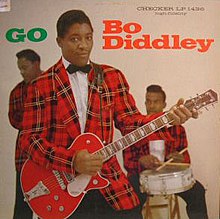
Moanin' in the Moonlight is the first album by American blues artist Howlin' Wolf, released by Chess Records in 1959. It contains songs previously issued as singles, including one of his best-known, "Smokestack Lightning". Rolling Stone ranked it number 477 on its 2020 list of "the 500 Greatest Albums of All Time".
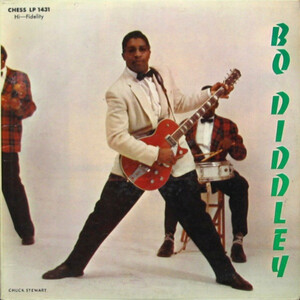
Bo Diddley is the debut studio album by American rock and roll musician Bo Diddley. It collects several of his most influential and enduring songs, which were released as singles between 1955 and 1958. Chess Records issued the album in 1958. In 2012, it was ranked number 216 on Rolling Stone's 500 Greatest Albums of All Time list alongside his second album, Go Bo Diddley (1959). The ranking of the album pair dropped to number 455 in the 2020 update of the list.
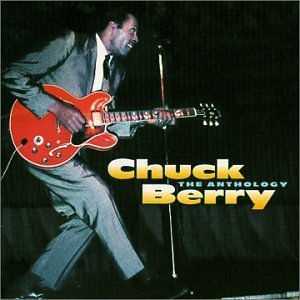
Anthology is a two-disc compilation album by American rock and roll musician Chuck Berry released on July 27, 2000, by Chess Records. It duplicates in its entirety the previous anthology The Great Twenty-Eight ranked at No. 21 on the Rolling Stone 500 greatest all time albums list, as well as the entirety of the later Definitive Collection issued in 2006 as part of the Universal series. The album was later reissued and packaged in 2005 as part of the Universal Records Gold series, and simply retitled Gold. It charted at No. 110 in the UK Albums Chart.

At Last! is the debut studio album by American blues and soul artist Etta James. Released on Argo Records in November 1960 the album was produced by Phil and Leonard Chess. At Last! also rose to no. 12 upon the Billboard Top Catalog Albums chart.
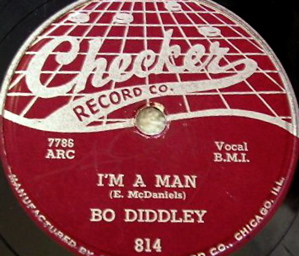
"I'm a Man" is a rhythm and blues song written and recorded by Bo Diddley in 1955. Inspired by an earlier blues song, it was one of his first hits. "I'm a Man" has been recorded by a variety of artists, including the Yardbirds, who adapted it in an upbeat rock style.

"Bo Diddley" is a rhythm and blues and rock and roll song first recorded by Bo Diddley at Universal Recording Corporation in Chicago and released on the Chess Records subsidiary Checker Records in 1955. Written by Diddley, its lyrics are based on the traditional lullaby titled "Hush Little Baby", and it prominently features the Bo Diddley beat that the singer made famous. It became an immediate hit single that stayed on the R&B charts for a total of 18 weeks, 2 of those weeks at #1, and seven more weeks than its flipside. It was the first recording to introduce African rhythms into rock and roll directly by using the patted juba beat. It was Diddley's first recording and his first hit single. The song is featured on many of Diddley's compilation albums including His Best.

"Who Do You Love?" is a song written by American rock and roll pioneer Bo Diddley. Recorded in 1956, it is one of his most popular and enduring works. The song represents one of Bo Diddley's strongest lyrical efforts and uses a combination of hoodoo-type imagery and boasting. It is an upbeat rocker, but the original did not use the signature Bo Diddley beat rhythm.
"Hey! Bo Diddley" is Bo Diddley's eighth single released by Checker Records. The single's B side was "Mona".
"Road Runner" is a 12-bar blues song performed by American rock and roll performer Bo Diddley, originally released as a single by Checker Records in January 1960, and later released on the LP record Bo Diddley in the Spotlight. The song reached #20 on Billboard magazine's Hot R&B Sides chart, and #75 on the Hot 100. The song has since been recorded by many artists.

Have Guitar Will Travel is the third studio album by rock and roll pioneer and blues icon Bo Diddley. It was released on the Checker Records label in 1960.

"Before You Accuse Me" is a song written and recorded by American musician Bo Diddley in 1957. The song was originally released as the B-side to Diddley's "Say Bossman" and included on his self-titled debut album in 1958. Backing Diddley on vocal and guitar on the original recording were Jody Williams on guitar, Willie Dixon on bass, and Frank Kirkland on drums. The song has also been recorded by several other artists, such as Creedence Clearwater Revival and Eric Clapton.
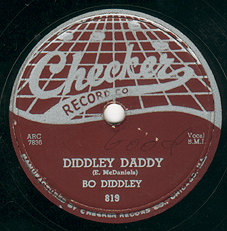
"Diddley Daddy" is a song by Bo Diddley. The song was issued as a single on Checker Records in June 1955. His second single, it followed on the heels of the success of the eponymous "Bo Diddley." The song spent four weeks on the Billboard R&B chart in the summer of 1955, peaking at No. 11.

Bo Diddley Is a Gunslinger is the fifth studio album by American rock and roll pioneer Bo Diddley released in December 1960 by Checker Records. The album title comes from the album's first track called "Gunslinger" and the cover art has Bo Diddley dressed in Western-style clothing. The songs for Bo Diddley is a Gunslinger were recorded from October 1959 to February 1960. Several tracks of interest are "Sixteen Tons" which Bo was supposed to perform on The Ed Sullivan Show, the title track, and "Diddling".

His Best is a 1997 greatest hits compilation album by American rock and roll icon Bo Diddley released by Chess and MCA Records on April 8, 1997. The album was re-released by Geffen Records on April 17, 2007 as The Definitive Collection with a different album cover. The Definitive Collection reached #2 on Billboard magazine's Blues Albums chart on June 21, 2008, which was the week that the album debuted on the charts.

His Best is a greatest hits album by Chicago blues harmonica player Little Walter, released on June 17, 1997 by MCA and Chess Records as a part of The Chess 50th Anniversary Collection. The album is seen as the CD successor to the 1958 The Best of Little Walter and features ten of the songs from that album.
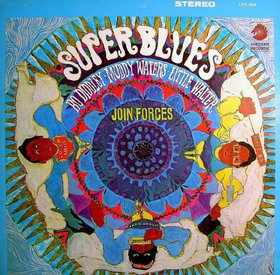
Super Blues is a 1967 studio album by a blues supergroup consisting of Bo Diddley, Muddy Waters, and Little Walter. The album was released in both mono and stereo formats by Checker Records in June 1967. A follow-up album The Super Super Blues Band was released later that year and featured Howlin' Wolf replacing Little Walter.

"You Don't Love Me" is a rhythm and blues-influenced blues song recorded by American musician Willie Cobbs in 1960. Adapted from Bo Diddley's 1955 song "She's Fine She's Mine", it is Cobbs' best-known song and features a guitar figure and melody that has appealed to musicians in several genres.

"You Can't Judge a Book by the Cover" is a 1962 song by rock and roll pioneer Bo Diddley. Written by Willie Dixon, the song was one of Diddley's last record chart hits. Unlike many of his well-known songs, "You Can't Judge a Book by the Cover" does not rely on the Bo Diddley beat. A variety of rock and other performers have recorded renditions of the song.

Bo Diddley is the eighth studio album by American rock and roll pioneer Bo Diddley, not to be confused with the 1958 compilation album of the same name. The 1962 album was released as Checker LP-2984 in August 1962 and featured the Willie Dixon-penned classic "You Can't Judge a Book by the Cover", which was released as a 7" 45 rpm single in July 1962.
"Hate to See You Go" is a blues song written and recorded by Chicago blues artist Little Walter. In 1955, Checker Records released it as one of three singles by Walter that year. The song, a one chord modal blues, is a reworking of "You Don't Love Me", written by Bo Diddley and recorded one month prior.
